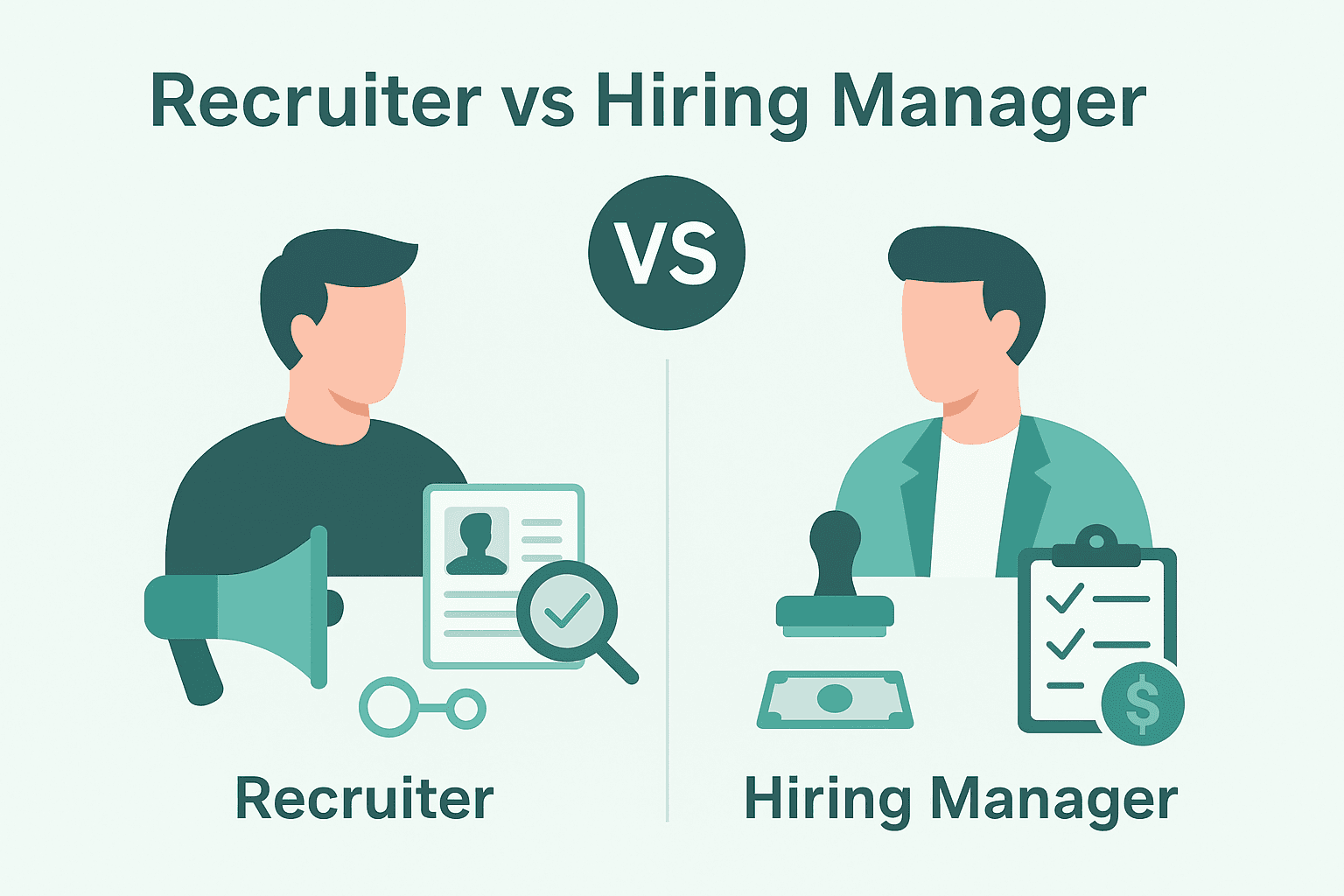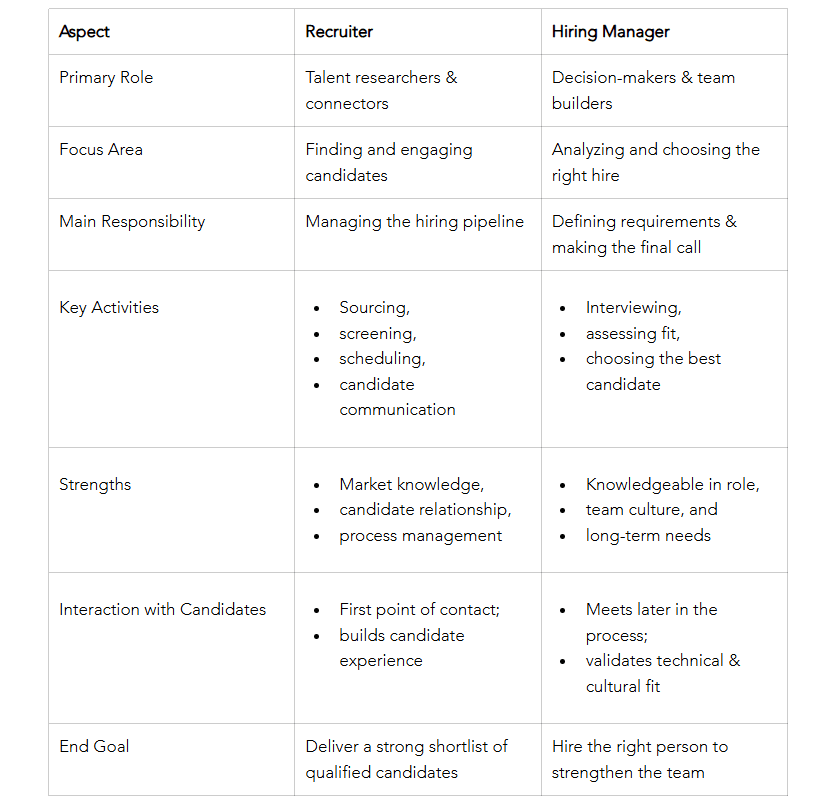What Is The Difference Between A Recruiter vs A Hiring Manager
Updated : 5 months ago

Have you ever found yourself stuck in a hiring loop where you’re not quite sure who’s actually in charge. Is it the recruiter or the hiring manager? Well, you’re not alone.
Many job seekers assume they’re the same person. Not just that, even some professionals in HR use the terms interchangeably.
But here’s the truth: Both play a crucial role in building great teams. However, their responsibilities are wildly different.
Think of it this way — if hiring were a blockbuster movie, the recruiter would be the casting director. They must be scouting and shortlisting the best talent. The same way the hiring manager would be the film’s director. They make the final call on who gets the role. Without any clarity, confusion brews, delays happen, and top talent can slip away.
Let’s break down the recruiter vs hiring manager debate once and for all. By the end, you’ll know exactly:
- Who does what in the hiring process?
- Why collaboration between the two is the secret sauce to smarter hiring.
- And most importantly, how understanding their roles can prevent costly hiring mistakes?
Let’s clear the fog. Knowing the difference can make you aware of a good hire and a great one.
Who is a Recruiter?

A recruiter is a talent acquisition professional responsible for -
- finding,
- attracting, and
- guiding candidates through the hiring process.
They act as the bridge between job seekers and the company. It ensures that only the most suitable candidates reach the interview stage.
Recruiters don’t usually make the final hiring decision. Their strength lies in -
building a pipeline of quality talent and managing candidate experience.
And, Who Is A Hiring Manager?

A hiring manager is the leader or supervisor of the team with the open position. They are not focused on sourcing candidates. But they choose the right person who will add value to their team.
They define -
- what skills and qualities are needed for the role,
- participate in interviews, and
- ultimately decide who gets hired.
Modern Applicant Tracking Systems like uRecruits help define these roles more clearly. It sets up structured workflows. Recruiters can focus on sourcing. However, the hiring managers can review shortlists and collaborate on decisions seamlessly.
What’s The Role of a Recruiter?

A recruiter acts like a matchmaker of the hiring world. Their job isn’t just to find candidates but to find the right ones. They make sure the candidate aligns with the
- company’s culture,
- job requirements, and
- future growth.
Recruiters wear multiple hats. They are the marketers, detectives, and relationship-builders. They know -
- where to hunt for talent,
- how to craft job descriptions that sell, and
- how to keep candidates engaged throughout the process.
Some of their core responsibilities include:
Sourcing talent:
They use job boards, social media, referrals, and databases to find out the potential candidates.
- Screening applications:
They check out the resumes, conduct screenings, and shortlist the most qualified profiles.
- Managing candidate experience:
They act as the primary point of contact, guiding candidates from application to offer.
- Coordinating logistics:
They schedule interviews, communicate with hiring managers, and ensure the process runs smoothly.
In short, recruiters set the stage. They bring the right players into the hiring pipeline. It helps hiring managers save time to easily reject the unqualified applicants. With platforms like uRecruits, recruiters can -
- source talent
- automate scheduling,
- send updates, and
- track candidate progress in one place
It makes the collaboration with hiring managers effortless.
Why There Is A Need For A Hiring Manager?

Now, if the recruiter is the casting director, the hiring manager is the final decision-maker. They are the one who knows exactly what the role demands and who has the power to say “you’re hired.”
The hiring manager is usually the -
- team leader,
- department head, or
- direct supervisor for the open position.
Their focus is less on sourcing candidates and more on evaluating fit for the role. They ensure the new hire can contribute to the team’s success.
Their responsibilities often include:
Describing the role: They create the job description adding the clear skills, qualifications, and expectations.
Interviewing candidates: They assess technical knowledge, cultural fit, and problem-solving skills during interviews.
Collaborating with recruiters: They share feedback on candidates, set expectations, and align on timelines.
Making the final decision: Finally, they choose the candidate who best fits the job and extend the offer.
Hiring managers ensure that the hiring decision is not just about filling a vacancy. But, about building a stronger team for a longer period.
Why Recruiter & Hiring Manager’s Collaboration Matters?
If recruiters and hiring managers worked in silos, hiring would be chaotic. It would be more like a guessing game. The recruiter might bring a lot of candidates. But it still needs validation from a hiring manager.
There are chances that they may not be the right fit. On the other side, a hiring manager without a recruiter could waste hours going through resumes. They will actually get distracted from the strategy and leadership.
When the two join forces, however, everything goes smoothly:
1. Faster Hiring Timelines
A recruiter gets dozens of qualified candidates. And, the hiring manager quickly identifies the best ones. Using a tool like uRecruits, recruiters and hiring managers can share feedback in real-time. It eliminates the bottlenecks and keeps top talent from going away to competitors.
2. Better Candidate Experience
Candidates hate confusion. The recruiters manage communication and a hiring manager provides clarity during interviews. As a result, the applicants feel respected and valued — even if they don’t get the job. uRecruits also provides candidates with timely updates and a transparent process. It reduces confusion and improves employer branding.
3. Higher Quality Hires
Recruiters understand the job market. The hiring managers understand the team’s needs. Together, they create a balanced evaluation process. It leads to better hires who are not only skilled but also culturally aligned.
4. Reduced Hiring Costs
Every delay in hiring is expensive. The collaboration ensures resources are used efficiently. Those lowers the cost per hire and maintains quality.
5. Stronger Employer Branding
When candidates experience smooth communication, transparent updates, and thoughtful interviews, they get a positive impression of the company. You must have heard that a word spreads faster than anything else.
So, What’s The Key Different Between The Both?

Finally…
The recruiter is the talent hunter. They are responsible for attracting and guiding candidates into the pipeline. However, the hiring manager is the final decision-make. They ensure the new hire is the right fit for the team and company.
When these two work in sync, the results are powerful:
- faster hiring timelines,
- stronger candidate experiences, and
- higher-quality hires.
At the end of the day, recruiters and hiring managers play different but equally important roles. When they work together — especially using the right tools like uRecruits — companies can speed up hiring. It improves candidate experience, and makes better hires.
Remember that the great hires don’t happen by chance, they happen through collaboration. And that collaboration begins with recruiters and hiring managers working hand in hand.
Frequently Asked Questions
1. What is the main difference between a recruiter and a hiring manager?
A recruiter focuses on sourcing, screening, and shortlisting candidates. The hiring manager makes the final decision on who gets hired for the team.
2. Who should a candidate contact during the hiring process?
Candidates usually interact with the recruiter first. They manage communication and updates. The hiring manager comes into the process during interviews and final evaluations.
3. Do recruiters make the final hiring decision?
No. Recruiters recommend and present qualified candidates. The hiring manager is the one who ultimately selects the new hire.
4. Can a hiring manager also act as a recruiter?
In smaller organizations, hiring managers may handle recruitment tasks. However, in most medium-to-large companies, recruiters manage sourcing while hiring managers focus on selection.

